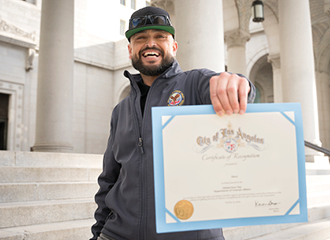One Simple Question Kick-Started Veteran’s Recovery
3-minute read
One Simple Question Kick-Started Veteran’s Recovery
3-minute read
After an injury and then substance use problems ended Mario’s military career, the Marine Corps Veteran went into a downward spiral that included divorce, gang membership, homelessness, and prison. He was just out of prison and starting to get into trouble again when he finally broke down. “I’m a Veteran. Is there no help for me?” he recalls saying.
It turned out help was available from VA. Mario just hadn’t been aware of it.
He took that help.
A military career cut short
Mario entered the Marine Corps to be a part of something bigger and to avoid being drawn into a gang in his hometown. But an injury to his lower back that he sustained during training changed all of that.
At first, the injury seemed like a temporary setback. Mario’s doctor prescribed Percocet for the pain. “They told me, ‘Just go home, go rest, and get back to work,’” Mario says. However, during his recovery, Mario began to drink alcohol along with the Percocet. His marriage was also on the rocks. “I was only 18,” he says. “I didn’t know how to be a father.”
Eventually, Mario’s troubles ended his career in the Marines.
“I was discharged prematurely,” Mario says. “There was no transitioning phase for me. I was told I could never step foot in another military base. I was disgraced. I just felt like I had failed because I was not able to manage my own life at the time.”
Making a plea
Mario went to prison after a DUI charge. His marriage collapsed, as did his relationship with his kids. He also ended up joining a gang. “I was just the wrong person,” he says. “I was mad at myself for many years.”
After leaving prison, Mario got into trouble again. He was at a low point. He knew he needed help but didn’t know if or where he could find it. Then he asked whether, as a Veteran, he could get support from VA.

Marine Gets Opportunity To Pick Up His Life After Substance Misuse
“They ran my numbers,” Mario says, “and all of a sudden, they called me back to tell me, ‘Hey, you’re eligible for health care services.’” Backed by court orders that required him to take several courses, including classes for anger management and for alcohol misuse, Mario decided to try the treatment options available to him through VA.
Getting help and giving back
Mario began residential rehabilitation treatment that provided wraparound services, which included access to a doctor, a psychiatrist, and a psychologist. This treatment gave him the opportunity to pick up his life and start again.
Mario also received ketamine therapy through VA. Ketamine has been found to provide rapid relief from depression and suicidal thoughts in some patients. At VA, ketamine can be considered for use for treatment-resistant depression.
“My experience with ketamine [therapy] allowed me to be able to recognize I’ve only been afraid of happiness because I never experienced it,” Mario says. “I was always staying away from it because I was afraid.”
As Mario began to get back on his feet, he again felt the impulse to be part of something bigger than himself. He became a Veteran peer specialist and is now helping his fellow Veterans.
Part of this is Mario’s work to help homeless Veterans get housing. Mario had experienced homelessness himself. So it was a special honor for him to receive a certificate of recognition from the city of Los Angeles for helping house about 80 fellow Veterans, in coordination with the U.S. Department of Housing and Urban Development-VA Supportive Housing intake team. “I was speechless at the time,” Mario says. “It’s a great honor. It motivated me more.”
Mario also encourages other Veterans to seek mental health services. “I don’t want another Veteran to go through what I went through when there’s a way out,” he says. “VA is there to give you an opportunity to try every day, so long as you have life.”
